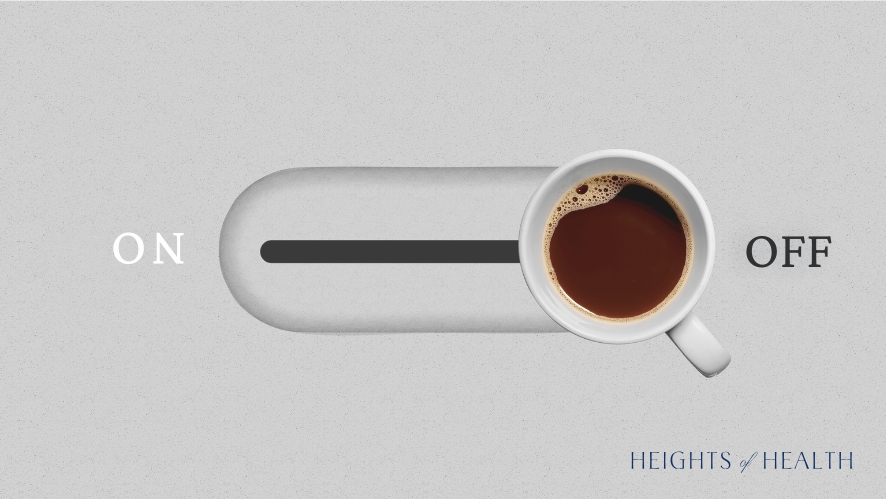Caffeine: Your Morning Cup’s Double-Edged Sword (and Why Your Genes Call the Shots)
Nov 18, 2025
Blog by: Tracy Southwick
Owner and Founder of Heights of Health
Master MBSR-P, ND, HHP, CNHP, CNA, AMP
Caffeine is the world’s favorite central nervous system stimulant. In small doses, it delivers mild euphoria, heightened alertness, and sharper cognitive performance by blocking adenosine receptors and boosting dopamine and norepinephrine. But overdo it, and the same molecule can trigger anxiety, restlessness, irritability, nausea, and insomnia, symptoms that mimic a panic attack.
Three Genes That Control How Your Body Handles Caffeine

Here’s the catch: how caffeine affects you isn’t just about dose, it’s about your genes. Caffeine metabolism varies up to 40-fold between and within individuals, and three key genes control the process:
1. CYP1A2 – The main detox engine
Encodes the liver enzyme that breaks down ~95% of caffeine.
- Fast metabolizers (AA genotype): Clear caffeine quickly.
- Slow metabolizers (AC/CC): Process it sluggishly, caffeine lingers 8+ hours, amplifying jitters and anxiety.
Slow CYP1A2 carriers who drink 2–3 cups daily have a higher risk of hypertension and heart attack.
2. COMT – The “warrior vs. worrier” gene
Regulates dopamine breakdown in the brain.
- Fast COMT (Val/Val): Efficient dopamine clearance → better tolerance for caffeine’s stimulating effects.
- Slow COMT (AA)**: Slower dopamine breakdown → caffeine + high dopamine = intense anxiety, overthinking, and emotional overstimulation.
AA carriers are especially prone to caffeine-induced panic, insomnia and restlessness.
3. NAT2 – The secondary detox pathway
Helps metabolize caffeine byproducts.
- Fast acetylators: Clear caffeine metabolites efficiently.
- Slow acetylators: Buildup of caffeine byproducts → prolonged stimulation, nausea, headaches, and insomnia.
The genetic combo matters
A slow CYP1A2 + slow COMT + slow NAT2 profile? You’re wired for maximum caffeine sensitivity—even one cup can leave you buzzing for hours. Meanwhile, someone with fast versions of all three can down an espresso at 6 PM and sleep like a baby.
Know your limits:

- Jittery 6 hours after coffee? Anxious or overthinking?
- Your genes may be saying: “Back off.”
- Remember caffeine comes from other sources, such as teas and chocolate.
Pro tips for sensitive types:
- Cut caffeine after noon
- Try half-decaf or green tea (lower caffeine + calming L-theanine)
- Consider our genetic testing to decode your caffeine DNA
- Give our King Coffee a try – It is organic coffee combined with adaptogenic Reishi mushrooms to help buffer your body’s response to the caffeine. It also supports the immune system and adrenal glands.
One person’s rocket fuel is another’s anxiety trigger. Your genes don’t lie—listen to them.
If you are wondering if this might be why you struggle with sleep or why you are dependent on coffee in the morning, you may want to discover your body’s own unique genetic response to caffeine and how to best manage it (or not). To set up your own confidential genetic test, call our office at 713-861-6777 to get the test shipped to you. (It only requires a cheek swab.)

